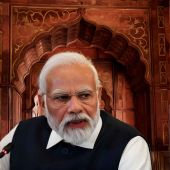"Temples touch souls, not wallets": Dakor Temple's new VIP Darshan fee ignites debates on faith vs. Finance, with Akshay Parmar opposing, it's not just about fees but the essence of devotion, will tradition bow to modernity or find a harmonious blend?

In the quaint town of Dakor, Gujarat, the serene surroundings of the Shri Ranchhodraiji Maharaj Mandir were disrupted by a chorus of discontent on August 26, 2023. A mere day after the temple management's controversial decision to levy charges for what is termed 'VIP darshan', a significant wave of protest rose amongst devotees and local leaders.
|
The announcement by the temple's committee did not sit well with many. As a result, multiple Hindu organizations and influential village sarpanchs (village headmen) took swift action. They swiftly drafted and submitted formal pleas to the temple's governing body, fervently urging them to revisit and reverse their recent decree.
While the temple precinct echoed with ritual chants, outside its walls, a very different kind of chant was on the lips of the aggrieved. Their heartfelt cry, "God is hungry for love; you are hungry for money," provided a poignant juxtaposition, illuminating the deep emotional and spiritual connection devotees hold with their place of worship.
The decision, deemed by many as commercializing a sacred experience, has led to a sentiment that the temple committee might be prioritizing monetary gains over the spiritual essence of darshan – a hallowed practice where devotees seek a visual connection with the deity.
A stern stance has been adopted by protestors. Beyond the pleas and emotional slogans, they have issued a direct warning, indicating their readiness to escalate the matter. Should the temple committee not yield, the protestors are committed to initiating a full-fledged agitation, thereby setting the stage for a potentially intense standoff between faith and administration.
|
VIP Darshan at Dakor Temple: A Divine Experience at a Cost
On the quiet evening of Thursday, August 24, 2023, the temple bells of Shri Ranchhodraiji Maharaj Mandir in Dakor rang for a significant change. The temple administration rolled out a pricing structure, attaching a monetary value to the hallowed practice of darshan. For a sum of 500, devotees could now secure a 'VIP Darshan,' granting them an intimate, closer glimpse of the revered Thakorji deity.
But the surprises didn't stop there. In a move that further fueled discussions, the temple committee introduced an additional provision. Now, male devotees, for a fee of 250, were allowed the option to join the female queue, which typically offers a more direct path to the deity.
Unsurprisingly, this commercial approach towards a ritual, deeply spiritual in its essence, did not bode well with a large section of the devotee community. The air was thick with discontent, and a significant number of worshipers made their grievances heard, both in voice and in action.
The temple grounds, usually a haven of peace, saw impassioned devotees echoing a powerful sentiment: “God is hungry for love; you are hungry for money”. This wasn’t just the voice of the elderly or the traditionalists. Young, fervent members of various Hindu organizations, along with representatives from the Sarpanch Association of Thasara Taluk, marched to the temple. Their message was clear: faith and finances should tread separate paths.
Their visit was not just symbolic. Apart from voicing their concerns orally, they submitted a written petition to the temple management. This documented dissent underlined their unified stance, advocating for the sanctity of religious practices to remain inviolable and immune from financial impositions.
Amidst the simmering discontent, some voices stood out prominently. Akshay Parmar, the distinguished Vice President of the Yuva Kshatriya Samaj Kheda district, and a respected representative of the Khijalpur sarpanch, didn't mince words in expressing his perspective. Labeling the temple committee’s recent decision as "irrational", Parmar delved deeper into the underlying issues that trouble many devotees.
The heart of the matter, according to Parmar, goes beyond the mere introduction of a fee. He elucidated that while the temple authorities articulate the fees as a means for devotees to get a closer view of Thakorji, the latent fear amongst many is far more profound. The decision, he stressed, might inadvertently give birth to a perception that intimacy with the divine could have a price tag attached. In an earnest appeal, Parmar laid out the potential consequences should the temple remain steadfast in its resolution. He highlighted that a collective decision has been reached among concerned parties: if the temple doesn’t reconsider, they're committed to observing a fast in protest – a traditional, peaceful method of dissent deeply rooted in Indian culture.
Yet, the narrative doesn't stop at VIP darshans. Detractors shed light on other concerns, asserting that the temple already benefits from generous donations and substantial funds. The financial aspect becomes even more pronounced when considering contributions from the Gujarat Pavitra Yatradham Board – a government entity that financially supports places of religious significance.
Moreover, critics astutely observed a tangible mismatch between the temple's financial capabilities and its infrastructure. They lamented the lack of ample parking facilities for the throngs of devotees who visit. Current arrangements see many relying on a distant privately-managed parking area, where additional parking fees become yet another burden.
But what caught the attention of many was an interesting parallel drawn by devotees between the Dakor temple and Mumbai's illustrious Siddhivinayak Temple. Mumbai, with its sprawling urban landscape and towering costs, has the famous temple charging a mere Rs. 50 for a speedier darshan experience. In stark contrast, the Dakor temple's hefty fee of Rs. 500 raises eyebrows and poses an inevitable question: Is the pricing a reflection of operational needs or a misplaced understanding of devotees' sentiments?
As the sun sets on Dakor, the temple bells might continue their age-old melody, but a new story is unfolding. A story of faith, finance, and the intricate balance between the two. It's more than just a clash between temple administrators and devotees; it's a reflection of changing times and the ongoing journey to find a harmonious blend between tradition and modernity. Only time will tell if the temple management will heed the voices of their devotees or if a more prolonged stand-off is on the horizon.
 Support Us
Support Us
Satyagraha was born from the heart of our land, with an undying aim to unveil the true essence of Bharat. It seeks to illuminate the hidden tales of our valiant freedom fighters and the rich chronicles that haven't yet sung their complete melody in the mainstream.
While platforms like NDTV and 'The Wire' effortlessly garner funds under the banner of safeguarding democracy, we at Satyagraha walk a different path. Our strength and resonance come from you. In this journey to weave a stronger Bharat, every little contribution amplifies our voice. Let's come together, contribute as you can, and champion the true spirit of our nation.
 |  |  |
| ICICI Bank of Satyaagrah | Razorpay Bank of Satyaagrah | PayPal Bank of Satyaagrah - For International Payments |
If all above doesn't work, then try the LINK below:
Please share the article on other platforms
DISCLAIMER: The author is solely responsible for the views expressed in this article. The author carries the responsibility for citing and/or licensing of images utilized within the text. The website also frequently uses non-commercial images for representational purposes only in line with the article. We are not responsible for the authenticity of such images. If some images have a copyright issue, we request the person/entity to contact us at This email address is being protected from spambots. You need JavaScript enabled to view it. and we will take the necessary actions to resolve the issue.
Related Articles
- Odisha Chief Minister Naveen Patnaik inaugurated renovated divine shrine Maa Tara Tarini Temple complex, one of the most revered temples on Kumari hills at the banks of Rushikulya river: modern day masterpiece
- Taking a dig at Samajwadi Party, Yogi stated that no one will know Uttar Pradesh by ‘Saifai Mahotsav’ and the people who organised it are now ‘past’: UP is now known for Kumbh and Ayodhya Deepotsav
- "Faith sees the invisible, believes the unbelievable, and receives the impossible": Kankaleshwar Mandir of Beed is a masterpiece of ancient Indian architecture surrounded by water on all sides dedicated to Mahadev, built by Chalukya King Vikramaditya VI
- 5 lakh kg of temple jewellery has been melted so far, DMK government planning to melt even more
- 'My deity is visible there. My deity is Viraajman there. Shivling was in their possession in Wazukhana, and they did sacrilege', says Hindu side Lawyer Vishnu Jain: Muslim side drilled a hole in Gyanvapi Shivling to claim it as a ‘fountain’
- "Ayodhya hui hamari, ab Kashi-Mathura ki baari": Plea submitted in Mathura Court to secure Shahi Idgah Masjid to protect Hindu sacred artefacts after Shivling discovered at wuzukhana in Gyanvapi premises
- Shivling discovered in the Gyanvapi complex during a survey after the water was pumped out of a well that Muslims were using as 'Wuzukhana' for washing their hands and feet before offering Namaz
- "नमस्ते शारदे देवि काश्मीरपुर-वासिनि": Devi Sharada has returned to Kashmir - a historical center of India’s cultural, religious & academic heritage that was once Centre of knowledge where scholars across the country use to visit for spiritual knowledge
- Muslim fundamentalists are not afraid of the Supreme Court of Pakistan and the government, demolished famous Hinglaj Mata Mandir in Pakistan: 11th attack in 22 months by religious fanatics
- Muslim community headed by Attar Hussain converted 'Guru Ki Sarai' into Mosque by intimidating a Sikh family in Patiala, Sikh symbols replaced by Islamic symbols: Situation tense as Hindu organisations protest
- Narasimha Anjaneyar temple demolished in Tamil Nadu despite devotees best efforts to save it, places of worship of other religions are spared
- Hindu side filed reply in Supreme Court: 'Gyanvapi property belonged to Lord Adi Vishweshwar since time immemorial, even before the Islamic rule in India, and hence cannot be handed to anybody'
- In Nagpur's Dussehra speech, RSS Chief Mohan Bhagwat examines Bharat's progress and societal hurdles, champions unity, vigilance, and national pride, Shankar Mahadevan commends RSS for upholding the 'Akhand Bharat' ideology', says 'Salute You'
- "ॐ नमः शिवाय": A Varanasi court allowed carbon dating of the Gyanvapi mosque, located next to the Kashi Vishwanath Temple, Archaeological Survey of India will carry out the scientific survey of the complex, wait of Nandi may be ending soon
- Construction of Ram Mandir in Ayodhya is in full flow with the foundation work finished, main contractor for construction is Larsen & Toubro while Tata Consulting Engineers are project management consultant













